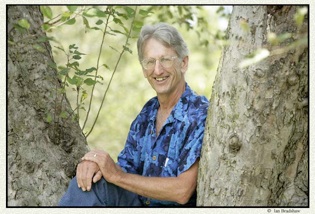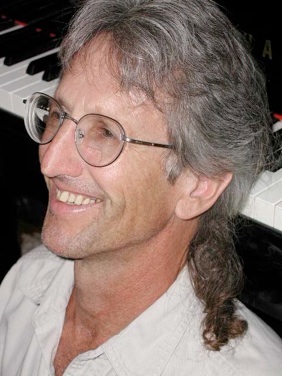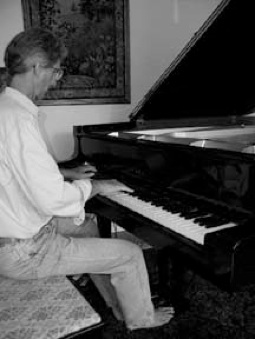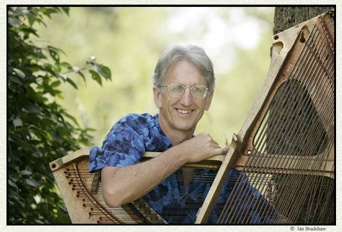I was first introduced to Greg Maroney and his music several years ago when he sent me his third CD, “The Sentinel,” to review. I loved the album and wanted to know more about him. I went to his website, there was a photo of him playing the piano shoeless. From that, I knew we had a lot in common - or at least we both enjoy playing without shoes! Since then, I have reviewed all five of Greg’s CDs and have been proofreading his sheet music. My more advanced students have been loving working on “The Chicken Chase,” “The Reluctant Ballerina,” and now “Elementals,” so I felt it was time to do an interview with the composer. Greg’s story is a little different from the other composers that I’ve interviewed in that he is a trauma nurse and lives in an old farmhouse in rural Pennsylvania. How does all of that tie into his music? Read on!
KP: Where did you grow up?
GM: I was born in Berkeley, CA and grew up in Walnut Creek and Orinda. We often went to Pinole, and my brother lived in Crockett for awhile, so I’m familiar with where you live. Right out of high school, in 1968, I moved to Santa Cruz, and lived there until we moved to Pennsylvania in ‘95. I went to UC Santa Cruz for awhile and studied piano and geology.
KP: That’s an interesting combination. You could be a rock musician! Oh, don’t tell me you never heard that before!
GM: No, I never really put the two together. Although it was interesting, I decided that geology really wasn’t my thing, so I became a paramedic. I worked in emergency medical services in Santa Cruz for nineteen years until we moved here. We wanted an old house to fix up and some property, and we couldn’t do that in California because it’s soooooo expensive! To backtrack a little, we bought a 7’ Yamaha grand piano, and the house we had in Santa Cruz was only 600 square feet - I’m talking tiny! The piano took up 3/4 of the living room, and my wife just couldn’t get away from it. She loved the music, but enough was enough. Since we couldn’t afford a bigger house in California, we expanded our search and ended up here in Pennsylvania on seven acres in a 100-year-old farmhouse. We’re almost done fixing it up, and we’re living happily ever after here in our countryside home. We grow our own vegetables and have chickens and lots of land to take care of. It’s pretty neat!
KP: Do you grow most of your own food then?
GM: Yes. We grow a lot of vegetables. We put up salsa, and freeze peppers and tomatoes like crazy. We use those throughout the winter. We also make jams, jellies, and pickles. It’s the heart of our eating. When I go to work at the hospital, I’ll put some salsa on a burrito, and it sustains me. With all the turmoil, death and destruction, my salsa is kind of a refuge - like being out in the garden.
KP: After you finish with the house, are you going to stay there and enjoy it?
GM: Yes. We’ve worked for ten years to get the house to where it is now. The house that we had in the Santa Cruz mountains was old and rundown when we bought it, and I rebuilt one quarter of it at a time. We lived in the other three quarters of the house. It took about six years. We sold that for a good profit, which enabled us to buy this place. I’m getting kind of tired of smashing my fingers, and would like to do something else. I’ve been writing my songs out, and I’m in the middle of making a sixth CD. We’ve sold out of some of the older CDs, so I want to remaster them. More and more time is going to the music.
KP: That’s a good thing!
GM: I wish I could devote all of my time to it.
KP: When did you start playing the piano?
GM: I started when I was five years old, and took music lessons through high school. I didn’t study much classical music - mostly the old standards. I Iearned about chord structure and what to do with the left hand when using fake books. After high school, I stopped formal lessons and branched out into other musical genres. I was more footloose and fancy free then, and didn’t have a piano, so I played guitar and some Middle Eastern instruments such as the saz, which is a long-necked stringed instrument. I played for some belly dancers for a while - that was fun! I studied the music of India and voice. Then I went through some catastrophic, life-altering events and basically lost everything. I realized that after everything was stripped away, I would always have music and my love of nature. Those things were mine, and nothing could take them away. That’s when I decided to focus more seriously on piano, 15-20 years ago, after I met and married my wife, Linda. She encouraged me, so this is all partly her doing, and she’s very supportive of the whole process. My first album, “Songs of the Water Rose,” was released in 1997, and it’s been moving ever since.

KP: When did you start composing?
GM: Probably in high school. My first songs were rudimentary and not very accomplished, but that’s when I started. I also did a lot of improvisation - especially with the stringed instruments. I got more serious about composing when I put my focus on the piano. In 1995, I started seeing a group of songs coalesce into something we could record. I’ve released five albums with about two years between them. There was a fairly long break between “Songs of the Water Rose” and “The Copper Hat,” but right after that, came “The Sentinel.” Then “Harmony Grove,” and “Wind Chimes,” which was released this past April.
KP: Do you plan to release #6 next year?
GM: I hope so, but there are so many other things. I want to get enough written music so I can make a book - I’m pretty close to that now. I want to remaster “Songs of the Water Rose,” and we have to reprint “The Sentinel” because we’ve sold a thousand copies of it and have run out. Those three things are going to require fairly substantial outlays of time and money, so the sixth album will probably come out after those are done unless I have some huge inspiration. Making a new album is more expensive than reproducing “Sentinel” or getting the songbook printed. As independent artists, we do it all ourselves.
KP: Do you record at your house?
GM: I do. I have a Yamaha C6, which is a nice piano, and is also a Disklavier. I can do a lot of the work here and then put the music on a floppy disk and send that to a recording studio. There is one in LA that has a 9’ Yamaha concert grand which is also a Disklavier. The engineer pops the disk into his piano and runs it through. It records, and then he sends the master back to me. It’s very easy and less expensive because I don’t have all of that studio time or the pressure. I do the work here at home where it’s relaxed and at my own pace. I hear about other artists going to the studio and sweating it out. One little mistake and you have to start over or edit it. I had a big upfront expense to get the piano, but it’s a nice instrument. It’s the piano we bought when we had the 600 square foot house!
KP: I understand that you’re still taking piano lessons. What do you do at this level after five CDs?
GM: I still work on the basic stuff like Hanon, but I do it in all the different keys. I’m also working on scales and classical music, and we work on technique. What I’ve learned the most from my teacher is how to elicit expression from the piano - how to speak with the piano.
KP: Is it more of a coaching type of thing? A combination?
GM: It’s a combination. I consider him my teacher, and he teaches me a lot. We do work on my music sometimes, but mostly we’re working on technique. He coaches and critiques me, and tells me what he thinks. I’ve been working with him for the past three years, and I think I’ve improved tremendously. Not only that, it makes me practice more because I’m paying him a lot of money! It’s an external discipline that makes me sit at the piano at 8:00 every morning and work. It’s been very good for me and it also gives me ideas for music. Sometimes I’ll hit a beautiful chord in a piece and I can create a song around that chord. It’s an external creative stimulus. There was a time when I was working on scales in the key of B, doing 3rds, 6ths and 10ths as well as arpeggios and octaves - quite a work out! My teacher wondered why I hadn't incorporated any of that into a song, so the next thing I knew, I was composing a song in the key of B that incorporated a descending 3rd scale. The moral is that you can take inspiration from the most ordinary daily routine and be creative with it - even your lesson material.
KP: Was your teacher a performing pianist?
GM: He studied at Juilliard and Peabody, but I think performing was just not his bag. He decided he didn’t want the stress and the jitters in his life and would rather teach. He teaches people like me, piano teachers, and he takes gifted high school students. He’s in demand, but he picks and chooses who he wants to work with.
KP: You went from being a paramedic to an emergency room/trauma nurse?
GM: I did. I’ve worked in the emergency medical field pretty much all of my working life. I worked in the ambulance from 1976-95. Although I loved being a paramedic, I was getting a little bit older and just wanted a change. I went back to college and got my nursing degree, and worked in the emergency department. I worked my way up and got some more certificates, and now I work in a big regional trauma center here in York. It’s a busy place, and I work hard. It’s very exciting and on the edge, with some real life and death things going on. There are times when it really does make a difference, and I like that feeling.
KP: After having a high-pressure job like that, does composing settle you back down and bring a balance?
GM: It does, but I try to keep the two separate. I play music at nursing functions, but I try not to bring work home with me. This type of music is more relaxing and does lend itself to unwinding, but since I work evening shifts, I don’t usually play after I get home. I play in the morning before I go to work, and that keeps them separate.
KP: I’m fascinated because I don’t think I could get all of the images of medical emergencies out of my head.
GM: There are a lot of those, especially as a paramedic. That’s one nice thing about not working in the field anymore. In Santa Cruz, after being a paramedic for twenty years, there were reminders everywhere I went. Now it’s just there in the hospital. You can get caught up in the emotional turmoil, so you have to be clinically detached and intervene with what patients need. It’s a human being that you’re looking at, but you have to gather information and figure out what you need to do and then do it. You have to be clear-headed. Music is emotional and comes from deeper inside, whereas this is very clinical - no emotions.
KP: You’ve said you do a lot of your composing about your natural surroundings. Let’s talk about that.
GM: There are a lot of things in my environment, especially since we’ve been out here, that trigger a song or an emotion that I’ll write about and express. There are a couple of songs in particular. My mother had Alzheimer’s disease two or three years ago. The whole family was struggling with that, so I wrote the piece, “Elementals” to express not the anger, but the angst that went along with watching my mother deteriorate. After she passed away, I wrote the song “Rising,” which is more about relief or a release. Her suffering was over, and so was ours, so that song was lighter. Another example is that my wife is into crafts and has made a lot of wind chimes. We have wind chimes in every bay on our front porch. One morning in May, we started to open the house up because the weather was turning nice. There was a little wind, and I heard the wind chimes. I started composing a song around the sound, and it became the title song of my most recent album, “Wind Chimes.” “Nature’s Fury” is about an approaching thunderstorm. Another one is “Taking Wing,” which is the first piece I play in concert. That was written about this time last year. We live by a creek, and I was looking out our kitchen window. There was this huge bird down by the water. I looked at it some more and thought, “That bird has a white head. Wait a minute - that’s a bald eagle!” There were two of them, and they stayed for about three weeks, just kind of passing through. They would fish in the creek, hang out, and fly around. I wrote that song about them flying. I think of that image when I play the song. That’s the kind of stuff that I can write about. Things that either happen to me or that happen in my environment translate into what I write about.
KP: What was your inspiration for “The Reluctant Ballerina”?
GM: Right after the piano tuner had left, I randomly plunked my fingers down and hit the first notes of that song. The voicing and the tuning was beautiful. For some reason, the vision of a young ballerina wearing a tutu flashed in my mind, and I saw this whole dance that she did. She began kind of quiet and timid. Then, as the music moved and progressed, she gained a little more courage. The beauty of the music moved her until she opened up and became one with the song. She danced and did leaps on the stage, and then came back to quietness and stillness. The song just kind of came to me after hitting the notes of that very first chord. I actually found a ballerina who choreographed a dance to it. We performed it in concert about a year and a half ago. It was pretty neat! She was young and wore her ballerina dress - she was perfect, just the image I had had!
KP: How do you go about composing? Do you just start hearing a melody?
GM: That’s kind of a great mystery. I’m not sure where it all comes from, but happens in a couple of different ways. With “The Reluctant Ballerina,” I just happened to hit the first chord of the song and it triggered this image. Sometimes it’s the other way around where I see an image like the eagles flying, and I’ll sit at the piano and try to put that emotion into the sound that the piano makes. The whole song doesn’t just pop out all of a sudden. It takes a lot of trial and error. Once I have the basic structure or the basic feel of the song and the image that goes with it, it really incorporates my ability to play and my technique, as well as my ability to imagine and to hear. It all works together while creating a song.
KP: When you sit down to play like that, do you have a recorder going?
GM: No. If it’s going to be a song, I remember it, so most of this stuff is just in my head. A song is kind of born like a child, almost. It’s great, because it’s creative energy, but it would be nice if it stopped once in awhile! Maybe not.
KP: Do you have the kinds of experiences Jace Vek talked about where he wakes up in the middle of the night and the room is full of music?
GM: No, because I really don’t wake up in the middle of the night. However, throughout the day, basically, I live in music. It’s always there, and it’s like that’s what I am. So, yes, I always hear music. It’s not necessarily something concrete enough to be able to go write it down, but I think of the general feelings and translate that into music. I might even sort of think in music.
KP: Do you get very many new ideas that just kind of pop into your head?
GM: Not if I’m away from the piano. It’s not prominent enough in my forethought for me to go and pick that melody out, but if I sit at the piano and start hearing it, I’ll go, “Yes, that’s what I’ve been hearing in my mind for a while.” I think it takes the prompting of actually hearing the notes on the piano to make it come out. It’s different from what Jace does because it doesn’t wake me up.
KP: How often have you played for the governors of Pennsylvania?
GM: I haven’t played much recently, but I‘ve played at the Governor’s mansion 10-15 times. We live near York, which is about twenty miles from the state capitol of Harrisburg. I played for three different governors over a bit of time. We have a Democratic governor now, and I don’t think he’s particularly into spending money on entertainment, so I haven’t been up there recently.
KP: Who or what do you consider to be your biggest musical influences?
GM: The very first one was Jim Chapell’s song “Gone.” It’s a gorgeous piece. When I first heard it, my emotional response was, “Woe!” I wanted to be able to do that and felt like I had that in me. He was one influence, and then, of course, there was the classical stuff. I like Debussy, and I love Mozart’s music - it’s light and so happy. Of the current composers? I’m sure David Lanz has influenced everybody - he was the original! I don’t think there is anyone who is strongly influencing me now.
KP: Your style is pretty strong and distinctive.
GM: Well, good. I didn’t want to sound like anybody else, so I’ve been trying to develop my own style. That’s not easy to do because it’s a risk any time you perform or do something original because it’s really part of you that you’re putting out there. If you’re kind of a shy and retiring person like I am, that’s difficult, but I think the more I did it, the stronger it became, so now it doesn’t make me quite so nervous. Playing for concerts still makes me nervous, though.
KP: It’s a lot of pressure!
GM: It is. It’s just you and your emotions and fingers. It probably gets easier after you’ve done it a lot. I’ve been doing it for about two years, and the audiences are getting larger. Once I’m out there, it’s not quite so bad, but it’s still a big risk.
KP: What kinds of things do you like to do in your free time?
GM: I kind of incorporate exercise and working on the house, so I just basically do stuff here. We love this piece of property and treat it with a lot of respect. In return, it makes us work, and gives us exercise and food. I garden, and I’m building a barn that’s about halfway done. I ride a bike a lot, and I think that takes about all of our time between almost full-time nursing and full-time piano.
KP: What kind of work does Linda do?
GM: She is a fitness trainer at a little gym about seven miles from here, and she’s a certified personal trainer. She works there part-time. The other time, she is what we call the “house elf.” She basically takes care of the house and the animals while I’m at work. That’s a good full-time job!
KP: If you could have any three wishes, what would they be?
GM: There’s the generic, “I wish there wouldn’t be any more war,” that people would treat each other with respect and the way they would want to be treated. World peace. I’d always like success in music. A long life, health, and happiness.
Many thanks to Greg Maroney for sharing his life with us! You can hear more of his music by visiting
his website and his
Artist Page here on MainlyPiano.com. Greg is also a Whisperings artist.
Kathy Parsons
November 2005




